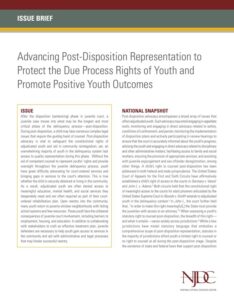Issue Brief-Advancing Post-Disposition Representation to Protect the Due Process Rights of Youth and Promote Positive Youth Outcomes
Post-disposition advocacy encompasses a broad array of issues that affect adjudicated youth. Such advocacy may entail engaging in appellate work; monitoring and engaging in direct advocacy related to safety, conditions of confinement, and parole; monitoring the implementation of disposition plans and actively participating in review hearings to ensure that the court is accurately informed about the youth’s progress; advising the youth and engaging in direct advocacy related to disciplinary and other administrative matters; facilitating access to family and social workers; ensuring the provision of appropriate services; and assisting with juvenile expungement and sex offender deregistration, among other things. A child’s right to counsel post-disposition has been addressed in both federal and state jurisprudence. The United States Court of Appeals for the First and Sixth Circuits have affirmatively established a child’s right of access to the courts in Germany v. Vance and John L. v. Adams. Both circuits held that the constitutional right of meaningful access to the courts for adult prisoners articulated by the United States Supreme Court in Bounds v. Smith extends to adjudicated youth in the delinquency context. In John L., the court further held that, “in order to make this right meaningful[,] the State must provide the juveniles with access to an attorney.” When assessing a youth’s statutory right to counsel post-disposition, the breadth of this right— and what it entails—varies widely across jurisdictions.6 While a few jurisdictions have model statutory language that embodies a comprehensive scope of post-disposition representation, statutes in the majority of jurisdictions afford youth a limited right to counsel or no right to counsel at all during the post-disposition stage. Despite the existence of state and federal laws that support post-disposition protections, the stark reality is that few jurisdictions have implemented this practice.

